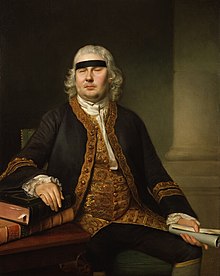John Fielding
Sir John Fielding (* 1721 in London ; † September 4, 1780 ibid) was a British judge who was known for his blindness and his social reforms.
Life
John Fielding came from the Earls of Denbigh family . His father was Colonel Edmund Fielding, who had fought with distinction under Marlborough . His older half-brother was the judge and writer Henry Fielding , and his older half-sister was the writer and translator Sarah Fielding .
At the age of 19, Fielding went blind from an accident in the Navy. But this ailment did not prevent Fielding from opening his own business. The Universal Register Office served as a travel agency, information service and real estate agency. While Fielding was earning his living in this way, he completed a law degree in London with the help of his brother Henry.
In 1750 he became an assistant to Henry, who had started as a justice of the peace to take measures against crime and social injustice. Together with John he set up the first professional police force in England. The Bow Street Runners , named after Bow Street where Henry's office was located, no longer served in guard rooms like the security guards, but patrolled the streets. In addition, the Fieldings published the first regular police reports with the Police Gazette , which contained profiles of the criminals and details of a possible reward. In this way, they managed to significantly reduce the number of crimes.
After Henry's death in 1754, John was appointed judge himself. The magistrate, which he clothed with it, combined the position of a judge with that of the Chief of the Metropolitan Police . He led the first mounted police patrol in London and consistently took action against crime and corruption. He only showed indulgence towards young criminals and advocated their rehabilitation. As a preventive measure, he also had schools set up in the poorer residential areas to enable the children to have a life outside of crime and prostitution. Because of his blindness, John Fielding was considered to be the personification of Justice and was already called The Blind Beak of Bow Street by his contemporaries . According to legends, he was able to distinguish over 3000 criminals by their voices.
In 1761 Fielding was beaten for his services to the Knight Bachelor . Sir John Fielding died on September 4, 1780 in Brompton Place, London.
Aftermath
The person of the blind judge Fielding has received a strong reception both literarily and cinematically.
The American writer Bruce Alexander Cook (1932-2003) wrote under the pseudonym Bruce Alexander since 1994 ( Blind Justice ) eleven detective novels with Sir John Fielding in the leading role.
Sir John Fielding also plays an important role in Lawrence Norfolk's "Lemprière's Dictionary". In 1984/1985, under the direction of Vojtěch Jasný, an ARD early evening series was shot under the title The Blind Judge , in which Franz-Josef Steffens played Sir John Fielding.
literature
- 1955 Patrick Pringle: Hue and Cry: The Story of Henry and John Fielding and the Bow Street runners .
- 1934 Ronald Leslie-Melville: The Life and Work of Sir John Fielding.
| personal data | |
|---|---|
| SURNAME | Fielding, John |
| ALTERNATIVE NAMES | Fielding, Sir John |
| BRIEF DESCRIPTION | British judge |
| DATE OF BIRTH | 1721 |
| PLACE OF BIRTH | London |
| DATE OF DEATH | September 4, 1780 |
| Place of death | London |
